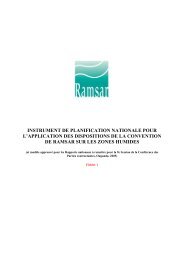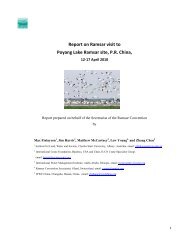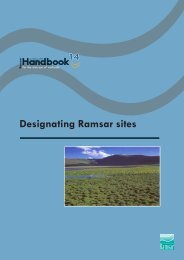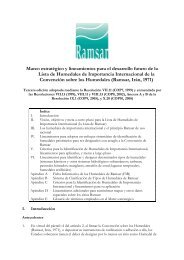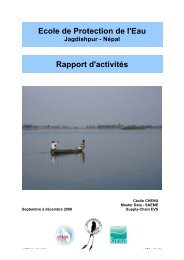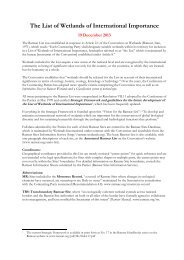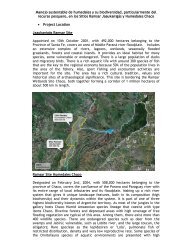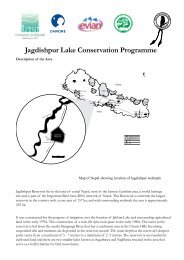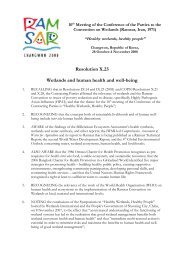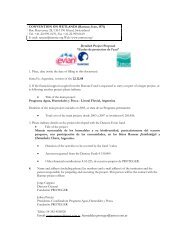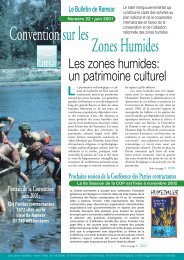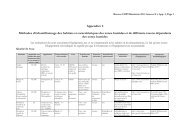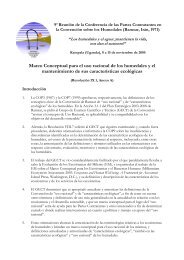Briefing Note - Ramsar Convention on Wetlands
Briefing Note - Ramsar Convention on Wetlands
Briefing Note - Ramsar Convention on Wetlands
Create successful ePaper yourself
Turn your PDF publications into a flip-book with our unique Google optimized e-Paper software.
Avoiding, mitigating, and compensating for wetland loss<br />
Malua BioBank, located in a c<strong>on</strong>servati<strong>on</strong> area in Sabah, Malaysia,<br />
issues biodiversity c<strong>on</strong>servati<strong>on</strong> certificates for the rehabilitati<strong>on</strong><br />
and preservati<strong>on</strong> of critical orangutan habitat. Copyright ©<br />
JPHTN. Available at: http://www.maluabank.com/gallery.html#.<br />
should address “the preventi<strong>on</strong>, eliminati<strong>on</strong> or mitigati<strong>on</strong><br />
of the impact, right from the incepti<strong>on</strong> stage of the<br />
project” (Notificati<strong>on</strong> I, S.O. 85(E), 1992).<br />
Japan: The Envir<strong>on</strong>mental Impact Assessment Law<br />
(originally enacted in 1997), which requires an EIA for<br />
all large-scale projects that may adversely affect the<br />
envir<strong>on</strong>ment, follows an avoid-minimize-compensate<br />
sequence (Tanaka, 2008). The Envir<strong>on</strong>mental Impact<br />
Assessment Guidelines, c<strong>on</strong>tained in The Third Nati<strong>on</strong>al<br />
Biodiversity Strategy of Japan (2007), make clear that<br />
avoiding impacts is the first step, stating that “avoidance<br />
and decrease of envir<strong>on</strong>mental impact[s]” be given priority,<br />
“rather than taking compensatory mitigati<strong>on</strong> by<br />
creating an equal envir<strong>on</strong>ment to the <strong>on</strong>e that would be<br />
lost by the project.”<br />
Malaysia: The State of Sabah’s Envir<strong>on</strong>ment Protecti<strong>on</strong><br />
Enactment (2002) requires an EIA or a proposal<br />
for mitigati<strong>on</strong> measures for development projects that<br />
may have a significant adverse impact <strong>on</strong> the envir<strong>on</strong>ment.<br />
A ‘mitigati<strong>on</strong> declarati<strong>on</strong>’ is defined<br />
as “an agreement signed by a pers<strong>on</strong> before<br />
commencement of any [prescribed]<br />
development activity.” The law imposes<br />
a duty to “avoid, remedy or mitigate any<br />
adverse effect <strong>on</strong> the envir<strong>on</strong>ment arising<br />
from any activity … whether or not such<br />
activity is … permitted.”<br />
and mitigate” them. The envir<strong>on</strong>mental protecti<strong>on</strong><br />
plan requires c<strong>on</strong>siderati<strong>on</strong> of measures to “reduce,<br />
mitigate, or eliminate the adverse impacts” identified<br />
in the detailed EIA. In additi<strong>on</strong>, the Law <strong>on</strong> Envir<strong>on</strong>mental<br />
Protecti<strong>on</strong> (1995) establishes that citizens shall have<br />
the duty to “prevent adverse envir<strong>on</strong>mental impacts<br />
and to restore or compensate for any damage or loss in<br />
the form of adverse envir<strong>on</strong>mental impacts arising from<br />
their c<strong>on</strong>duct.” The law refers to compensati<strong>on</strong> in the<br />
c<strong>on</strong>text of natural resources valuati<strong>on</strong>, stating that a resource’s<br />
“ec<strong>on</strong>omic value shall form the basis for determining<br />
the level of payments and fees for resource use<br />
and the amount of compensati<strong>on</strong> payable in the case<br />
of adverse envir<strong>on</strong>mental impacts and direct damage.”<br />
Restorati<strong>on</strong> costs may be part of the compensati<strong>on</strong>.<br />
Vietnam: The 2011 decree <strong>on</strong> “protecting strategic<br />
envir<strong>on</strong>mental assessment, envir<strong>on</strong>mental impact assessment<br />
and envir<strong>on</strong>mental protecti<strong>on</strong> commitment”<br />
requires that any strategic envir<strong>on</strong>mental assessment<br />
report must include “measures to prevent and mitigate<br />
adverse envir<strong>on</strong>mental impacts.”<br />
Avoid-mitigate-compensate approaches in<br />
Europe<br />
European Uni<strong>on</strong>: The EU has endorsed an avoid-mitigate-compensate<br />
approach in several c<strong>on</strong>texts. For<br />
example, guidance <strong>on</strong> Article 6 of the Habitats Directive<br />
92/43/EEC (2000) defines mitigati<strong>on</strong> as “measures<br />
aimed at minimising or even cancelling the negative impact<br />
of a plan or project, during or after its completi<strong>on</strong>.”<br />
Guidance <strong>on</strong> these measures calls for a “hierarchy of<br />
preferred opti<strong>on</strong>s” where avoiding impacts is the highest<br />
preference (European Commissi<strong>on</strong>, 2001). Where<br />
no alternative soluti<strong>on</strong>s exist (i.e., where impacts to a<br />
Natura 2000 site cannot be avoided) and adverse impacts<br />
remain, then “compensatory measures” must be<br />
M<strong>on</strong>golia: The Law <strong>on</strong> Envir<strong>on</strong>mental Impact<br />
Assessment (2001) requires an EIA for<br />
development activities that may adversely<br />
impact the envir<strong>on</strong>ment. The EIA must<br />
identify potential adverse envir<strong>on</strong>mental<br />
effects, as well as measures to “minimize<br />
European Commissi<strong>on</strong>, 2001. Assessment of Plans and Projects Significantly Affecting<br />
Natura 2000 Sites: Methodological Guidance <strong>on</strong> the Provisi<strong>on</strong>s of Article 6(3)<br />
and (4) of the Habitats Directive 92/43/EEC. Available at: http://ec.europa.eu/envir<strong>on</strong>ment/nature/natura2000/management/docs/art6/natura_2000_assess_en.pdf.<br />
Download PDF at www.ramsar.org/bn/bn3.pdf 5



